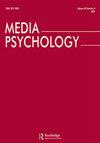Empowerment-Themed Advertising Effects: Activation of Empowerment and Objectification Schemas in Women Age 18-35
IF 3.4
2区 心理学
Q1 COMMUNICATION
引用次数: 0
Abstract
ABSTRACT Advertisements that ostensibly serve to empower women have become popular in recent years, but recent research calls into question the psychological effectiveness of these advertisements. While seemingly progressive, empowerment-themed advertisements (ETAs) often pair empowerment-themed narratives with objectifying visuals despite the established harmful effects of objectification in media. Though empowerment and objectification intuitively seem incompatible, this relationship has not been empirically tested. The current study used experimental design to examine the relationship between empowerment and objectification schemas following exposure to ETAs. U.S. women age 18–35 (N= 273) were randomly assigned to view advertisements from one of five conditions displaying combinations of high/low empowerment and objectification themes. They then completed a lexical decision task (LDT) to measure schema activation. While ETAs were perceived as significantly more empowering than other advertisement types in the manipulation check, no advertising condition exhibited greater activation of empowerment schemas than the control group as measured by the LDT, suggesting that ETAs were largely ineffective at activating empowerment schemas. Contrary to initial expectations, there was no evidence that objectification content suppressed priming of empowerment schemas, though interpretation of the objectification schema findings is complicated by the likely impact of cognitive load on LDT response times.赋权主题广告效应:18-35岁女性赋权与物化图式的激活
近年来,表面上是为了赋予女性权力的广告越来越受欢迎,但最近的研究对这些广告的心理效果提出了质疑。虽然看起来是进步的,但以赋权为主题的广告(ETA)经常将赋权主题的叙事与物化的视觉效果结合起来,尽管媒体中存在物化的有害影响。尽管授权和客体化在直觉上似乎是不相容的,但这种关系还没有经过实证检验。目前的研究使用实验设计来检验暴露于ETA后授权和客体化模式之间的关系。年龄在18-35岁(N=273)的美国女性被随机分配观看五种条件之一的广告,这些条件显示了高/低授权和客观化主题的组合。然后,他们完成了词汇决策任务(LDT)来测量模式激活。虽然在操纵检查中,ETA被认为比其他广告类型更具授权,但根据LDT测量,没有任何广告条件比对照组表现出更大的授权模式激活,这表明ETA在激活授权模式方面基本无效。与最初的预期相反,没有证据表明客体化内容抑制了授权图式的启动,尽管认知负荷对LDT反应时间的可能影响使客体化图式研究结果的解释变得复杂。
本文章由计算机程序翻译,如有差异,请以英文原文为准。
求助全文
约1分钟内获得全文
求助全文
来源期刊

Media Psychology
Multiple-
CiteScore
8.60
自引率
7.10%
发文量
30
期刊介绍:
Media Psychology is an interdisciplinary journal devoted to publishing theoretically-oriented empirical research that is at the intersection of psychology and media communication. These topics include media uses, processes, and effects. Such research is already well represented in mainstream journals in psychology and communication, but its publication is dispersed across many sources. Therefore, scholars working on common issues and problems in various disciplines often cannot fully utilize the contributions of kindred spirits in cognate disciplines.
 求助内容:
求助内容: 应助结果提醒方式:
应助结果提醒方式:


